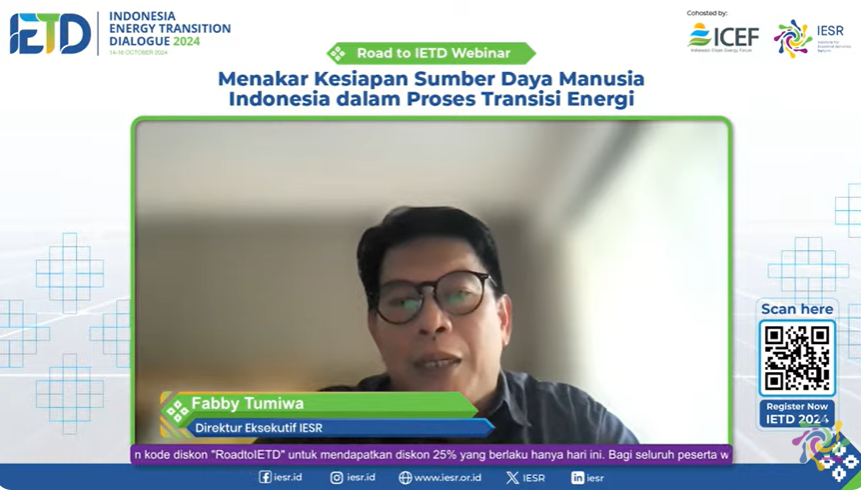Jakarta, 27 August 2024 – Decarbonization of the energy system towards net zero emission (NZE) in line with the Paris Agreement to limit the earth’s temperature below 1.5 degrees Celsius will create extensive employment and job opportunities, particularly for the younger generation. Based on the Institute for Essential Services Reform (IESR) study titled “Deep decarbonization of Indonesia’s energy system”, it is estimated that the number of jobs created in the electricity sector alone could reach up to 3.2 million jobs by 2050. This number of jobs will increase if a comprehensive energy system decarbonization strategy is implemented.
IESR assesses that the potential for creating new jobs requires the readiness of human resources (HR) who have the expertise and special skills needed. For this reason, strategic policy support is needed to encourage vocational training and universities so that the energy transition can create sustainable economic opportunities for the entire community.
The Executive Director of IESR, Fabby Tumiwa, at the Webinar “Road to Indonesia Energy Transition Dialogue (IETD): Measuring the Readiness of Indonesia’s Human Resources in the Energy Transition Process”, highlighted the phenomenon of high levels of open unemployment dominated by Gen Z (age group 15-24 years). Based on data from the Central Statistics Agency (BPS), the number of unemployed people in the Gen Z age group reached 3.5 million out of a total of 7.2 million open unemployment as of February 2024. He emphasized that jobs created by the energy transition process will require human resources who are highly competitive, have special skills and certifications.
“To meet the workforce needs in the energy transition era, the role of educational institutions, such as vocational schools, colleges and universities, is important. For example, vocational schools with light vehicle automotive majors can begin to shift to studying the electric vehicle industry, and vocational schools with building engineering majors can study the concept of green building. Tens of thousands of skilled technicians are needed to install solar power plants to a high standard in the coming years. The government is also expected to encourage and facilitate new study programs based on skill needs to support the energy transition, which is currently still very limited in Indonesia,” Fabby added.
IESR encourages the government to prepare Indonesia’s human resources through training and workforce capacity building, as well as strengthening coordination between relevant ministries. IESR offers five strategies to ensure Indonesia’s human resources are highly competitive in the energy transition era.
First, identify the expertise and skills needed for the energy transition and formulate a targeted strategy to develop the expertise, skills and capacity of the skilled workforce needed in the clean energy sector. Second, increase the budget to build clean energy technology training, education and certification facilities Third, improve coordination between policy makers related to the energy transition and agencies responsible for preparing labor and professional experts, namely the Ministry of Manpower and the Ministry of Education, Culture, Research and Technology, so that they are actively involved in the energy transition discussion to ensure the readiness of the labor sector to face the changing landscape of employment opportunities and jobs. Fourth, prepare training and capacity building programs for workers from the fossil energy sector to master jobs in the clean energy sector and be able to transition when the energy transition begins. Fifth, facilitate job transitions to reduce potential unemployment due to the energy transition by using the government’s fiscal capacity.
Ahmad Khulaemi, Widyaiswara Ahli Madya, Ministry of Energy and Mineral Resources (ESDM) said that his party has two strategies to improve the quality of human resources, namely training and certification. For example, energy audit training, which covers the fields of electricity, mechanics and buildings. By 2023, around 189 energy auditors have been certified. In addition, there are Patriot and Guerrilla programs, which introduce the younger generation, especially final-year students, to various types of renewable energy such as solar, wind and water energy.
“Currently, there are four national priority programs of the Center for Human Resource Development for Electricity, New Energy, Renewable Energy and Energy Conservation (PPSDM KEBTKE) for 2024, including community training programs for solar PV, hydro power, Installation of Electricity Utilization (IPTL) and conversion of fuel motorcycles to electric motors. Not only that, we are currently preparing a plan for community training programs in the 2025 fiscal year and developing training programs for industry and competency certification for workers in the renewable energy sector,” Ahmad said.
Adi Nuryanto, Director of Partnership and Alignment of Business and Industry, Ministry of Education, Culture, Research and Technology (Kemendikbudristek) said that the energy transition process brings great opportunities as well as challenges due to the gap between industry needs and education curriculum. For this reason, collaboration with industry is very important, including internship programs, joint curriculum development, teaching by industry practitioners, project-based learning, competency certification, applied research, and commitment to employment.
“Vocational education must also receive updates from the industry to remain relevant. Currently, vocational education has shown significant progress by involving 508 students and 3,031 vocational schools in renewable energy-related programs. However, vocational education still needs assistance from the Ministry of Energy and Mineral Resources and industry so that students have practical experience in the industry and an in-depth understanding of business processes in the renewable energy industry,” said Adi.
The discussion on ensuring that the energy transition process takes place fairly, especially for affected workers, will be discussed further at the Indonesia Energy Transition Dialogue (IETD) 2024 which will take place on October 14-16, 2024. The theme of IETD 2024 is “Realizing a Just and Directed Energy Transition”. Registration can be accessed https://www.ietd.info/.

